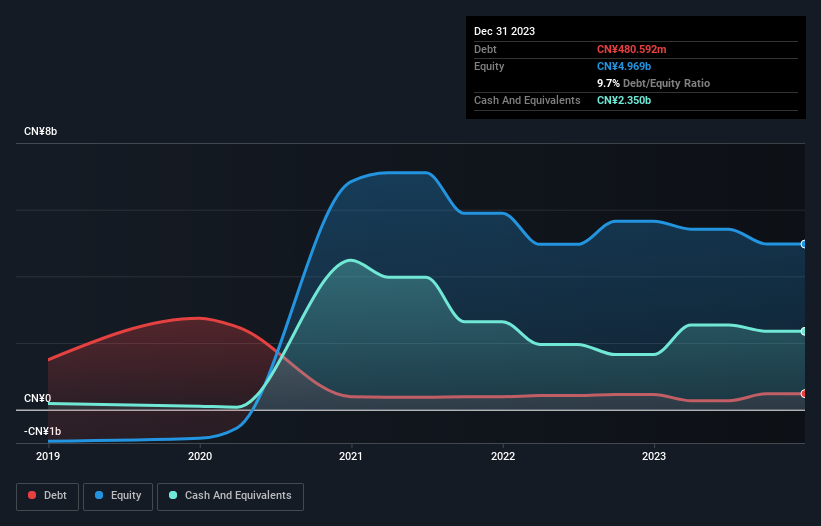Does Everest Medicines (HKG:1952) Have A Healthy Balance Sheet?

David Iben put it well when he said, 'Volatility is not a risk we care about. What we care about is avoiding the permanent loss of capital.' When we think about how risky a company is, we always like to look at its use of debt, since debt overload can lead to ruin. We can see that Everest Medicines Limited (HKG:1952) does use debt in its business. But should shareholders be worried about its use of debt?
What Risk Does Debt Bring?
Generally speaking, debt only becomes a real problem when a company can't easily pay it off, either by raising capital or with its own cash flow. Ultimately, if the company can't fulfill its legal obligations to repay debt, shareholders could walk away with nothing. However, a more frequent (but still costly) occurrence is where a company must issue shares at bargain-basement prices, permanently diluting shareholders, just to shore up its balance sheet. Of course, plenty of companies use debt to fund growth, without any negative consequences. When we examine debt levels, we first consider both cash and debt levels, together.
View our latest analysis for Everest Medicines
How Much Debt Does Everest Medicines Carry?
You can click the graphic below for the historical numbers, but it shows that as of December 2023 Everest Medicines had CN¥480.6m of debt, an increase on CN¥455.0m, over one year. But on the other hand it also has CN¥2.35b in cash, leading to a CN¥1.87b net cash position.

A Look At Everest Medicines' Liabilities
According to the last reported balance sheet, Everest Medicines had liabilities of CN¥300.1m due within 12 months, and liabilities of CN¥504.0m due beyond 12 months. Offsetting this, it had CN¥2.35b in cash and CN¥131.8m in receivables that were due within 12 months. So it can boast CN¥1.68b more liquid assets than total liabilities.
This excess liquidity suggests that Everest Medicines is taking a careful approach to debt. Due to its strong net asset position, it is not likely to face issues with its lenders. Simply put, the fact that Everest Medicines has more cash than debt is arguably a good indication that it can manage its debt safely. When analysing debt levels, the balance sheet is the obvious place to start. But ultimately the future profitability of the business will decide if Everest Medicines can strengthen its balance sheet over time. So if you want to see what the professionals think, you might find this free report on analyst profit forecasts to be interesting.
Over 12 months, Everest Medicines reported revenue of CN¥126m, which is a gain of 884%, although it did not report any earnings before interest and tax. When it comes to revenue growth, that's like nailing the game winning 3-pointer!
So How Risky Is Everest Medicines?
While Everest Medicines lost money on an earnings before interest and tax (EBIT) level, it actually generated positive free cash flow CN¥545m. So taking that on face value, and considering the net cash situation, we don't think that the stock is too risky in the near term. We think its revenue growth of 884% is a good sign. There's no doubt fast top line growth can cure all manner of ills, for a stock. The balance sheet is clearly the area to focus on when you are analysing debt. But ultimately, every company can contain risks that exist outside of the balance sheet. For instance, we've identified 2 warning signs for Everest Medicines that you should be aware of.
Of course, if you're the type of investor who prefers buying stocks without the burden of debt, then don't hesitate to discover our exclusive list of net cash growth stocks, today.
Valuation is complex, but we're here to simplify it.
Discover if Everest Medicines might be undervalued or overvalued with our detailed analysis, featuring fair value estimates, potential risks, dividends, insider trades, and its financial condition.
Access Free AnalysisHave feedback on this article? Concerned about the content? Get in touch with us directly. Alternatively, email editorial-team (at) simplywallst.com.
This article by Simply Wall St is general in nature. We provide commentary based on historical data and analyst forecasts only using an unbiased methodology and our articles are not intended to be financial advice. It does not constitute a recommendation to buy or sell any stock, and does not take account of your objectives, or your financial situation. We aim to bring you long-term focused analysis driven by fundamental data. Note that our analysis may not factor in the latest price-sensitive company announcements or qualitative material. Simply Wall St has no position in any stocks mentioned.
About SEHK:1952
Everest Medicines
A biopharmaceutical company, engages in the discovery, license-in, development, and commercialization of therapies and vaccines to address critical unmet medical needs in Greater China and other Asia Pacific markets.
High growth potential with excellent balance sheet.
Market Insights
Community Narratives



